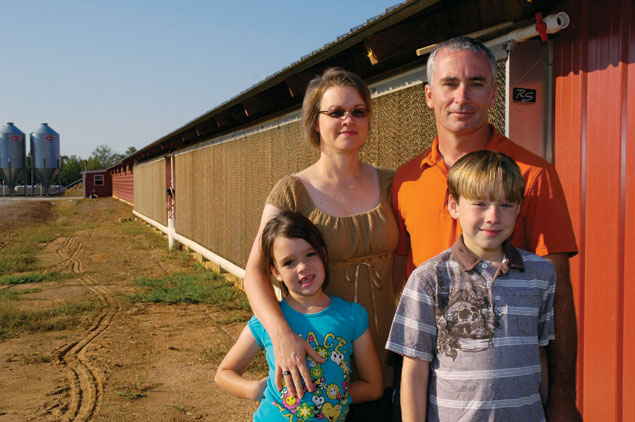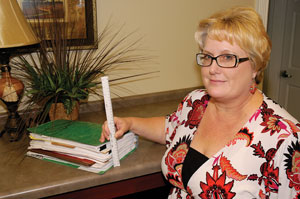
Crystal and Jody Melton with daughter Zoe and son Sebastian stand in front of one of their new broiler houses.
Photos by Sheryl Smith-Rodgers
Jody Melton remembers the exact moment he realized he had to make a huge change in his life.
“When my little girl told me that I was a mean person, I quit driving my logging truck and sold it that day,” he says, seated at the kitchen table of his family’s home in eastern Alabama. “Driving is stressful work, and I’d get home late. I also spent most Saturdays fixing my truck.”
Now self-employed as a poultry farmer, Melton spends more time at home, coaches his daughter’s T-ball team and takes both his children — Sebastian, 11, and Zoe, 7 — back and forth to school. He also smiles more. “I’m real happy,” he says, grinning, “which makes my wife, Crystal, happy, too.”
Of course, Melton’s career switch didn’t happen overnight. In fact, a few changes in direction came first. But when he was ready to build four chicken houses, the staff at Alabama Farm Credit went the extra mile to make sure his dream became reality.
“I grew up on a farm, and Jody grew up on a farm,” says Jim Tollison Jr., vice president and branch manager in Talladega, Ala. “And that’s what we at Farm Credit want to continue to see happen.”
Changing Course
After selling his truck on that day in March 2007, Melton — who has a degree in elementary education and early childhood education — returned to school to obtain his teaching certificate. However, he just couldn’t let go of his dream.
“I’d always wanted to try poultry farming, but I never thought seriously about it until my brother-in-law bought some chicken houses in the summer of 2007,” Melton says. “I helped him remodel six houses. Then when I helped him unload the chicks, I knew that I’d wasted my money at school.”
Eager to learn more about the poultry business, he and Crystal toured several egg houses. Melton also contacted a hatching manager with Koch Foods Inc. and obtained company literature. “At first, I thought I wanted to have egg houses,” he recalls. “Crystal and I looked at a farm for sale with existing houses, but I decided I could build them cheaper. We were ready to go, but then the housing bubble popped in 2008.”

Meanwhile, Melton had gone back to driving part time to help make ends meet. He’d also changed his mind and decided broiler houses posed less risk. In spring 2009, Koch Foods approached Melton and asked if he’d build four broiler houses. He agreed, but first he had to obtain financing.
A Stumbling Block
In the poultry industry, large broiler chicken producers contract with “integrators,” a term that refers to companies such as Koch Foods. The integrator owns it own breeder flocks, hatcheries, feed mills and processing plants but contracts with farmers to grow out the chickens. While the farmer provides land, labor, housing, equipment and utilities for the poultry operation, the integrator provides the birds, feed, medication and technical advisers to the farmer. Pay is based on pounds of live birds produced.
Contracts between integrators and producers typically cover one batch of chickens. A fresh batch requires its own contract. In 2009, however, new governmental guidelines for loan guarantees issued by the Farm Service Agency required three-year contracts with integrators.
In Melton’s agreement with Koch, that wasn’t likely to happen.
“Jody and Crystal were caught in a gray area that year,” Tollison says. At the time, he explains, there was only one processor serving the Meltons’ area.
“Any time you have a single poultry processor availability issue within the industry, you need to be able to diversify the risk. We knew the Meltons had a good lending situation, but we needed to offset the risk — not with them, but within the industry.
“The easiest thing to do would have been to turn them down. But they were good people with a solid business plan. If it hadn’t been a good loan,” he adds, “then we wouldn’t have done it in the first place.”
Pecking Away at a Complicated Process
Meanwhile, Tollison and his staff investigated another option: a loan guarantee through the Small Business Administration (SBA). “I knew of other banks using SBA guarantees for ag businesses, but no one in our office had done one in 10 or more years. Neither had officers in other branches. So I sat down with Chuck Roberts, who was then our loan officer, and Administrative Assistant Terri Smith, and we read the SBA manual. Training and information on an SBA loan guarantee was minimal. But I later talked to Jody and told him that if he could bear with me, we’d get through the process.”
The process turned out to be extremely complicated, time-consuming and frustrating. “No telling how many hours I spent on hold on the phone,” Tollison says, chuckling. “Our calls to the SBA didn’t always get to the right person. A lot of times, it took awhile to find someone who could answer our specific questions.”
Required paperwork also had to be filled out perfectly. “We had to recalculate ratios and create our own templates for forms,” Tollison says. “I spent one evening on my home printer, scanning in paperwork so we could have digital documents on which to type. After we filled out forms, Chuck and Terri proofread while I printed out reams of paperwork.”

Terri Smith from Alabama Farm Credit measures the Meltons’ loan file at 4 inches.
Application Approved
In October 2009, their loan guarantee application to the SBA was approved, provided certain requirements were met. “For instance, we had to include seismographic plans,” Tollison says. “We don’t get too many earthquakes in Alabama. But we were able to work around that due to limited issue and our assuming some risk during the construction period.
“We could not have done the loan without that SBA guarantee,” Tollison adds. “Loan guarantee programs like this one help us to serve our customers, while protecting our portfolio.”
From the start, Melton both understood and supported the bank’s position. “I put a lot of faith in Jim,” he says. “Whenever I’d call him, he’d always call back, even if it was at night, and tell me what was right and what was wrong. As for our loan, I agreed with what he told me: that Farm Credit would like to do everyone’s loan, but they can’t do everyone’s loan.”
In December, just minutes after the loan closed, a road-grading truck drove by, en route to the Melton property. Six months later, construction crews completed four new broiler houses, located just a short drive away from the family’s home.
Melton admits that his first few weeks in the broiler business were challenging and rough. But a year later, he couldn’t be happier with the work.
“My wife says I’m a lot more likable now,” Melton smiles. “My daughter, though, says she wishes I was a school teacher. But she doesn’t always get a vote.” – Sheryl Smith-Rodgers